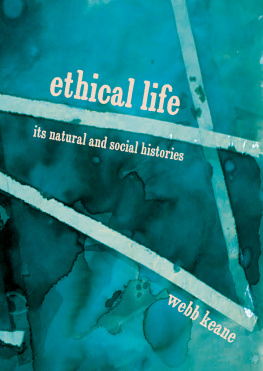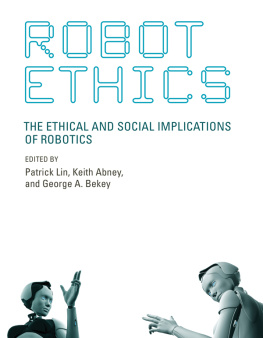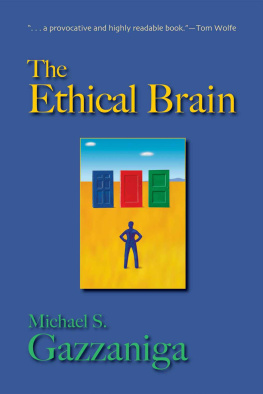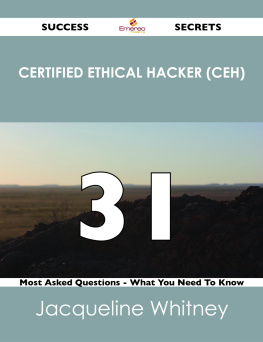
ETHICAL LIFE

ETHICAL LIFE
ITS NATURAL AND SOCIAL HISTORIES

WEBB KEANE
PRINCETON UNIVERSITY PRESS
PRINCETON AND OXFORD
Copyright 2016 by Princeton University Press
Published by Princeton University Press, 41 William Street, Princeton, New Jersey 08540
In the United Kingdom: Princeton University Press, 6 Oxford Street, Woodstock, Oxfordshire OX20 1TW
press.princeton.edu
Jacket art by Webb Keane, photographed by Clara Keane. Courtesy of the author.
All Rights Reserved
ISBN 978-0-691-16773-2
Library of Congress Control Number 2015942446
British Library Cataloging-in-Publication Data is available
This book has been composed in Sabon Next LT Pro with Trajan Pro Display.
Printed on acid-free paper.
Printed in the United States of America
1 3 5 7 9 10 8 6 4 2
FOR MY TEACHERS AND STUDENTS

CONTENTS

ACKNOWLEDGMENTS

Like ethical life itself, even the solitary business of writing is thoroughly enmeshed with the voices of other people. Here are just a few of those who lurk in these pages. Matthew Engelke, Don Herzog, James Laidlaw, and Adela Pinch read the entire manuscript at least once, each with unsparing acuity. In Adelas case, this has been yet another conversational turn in a dialogue that for decades has influenced my thinking about, well, pretty much everything. Jonathan DeVore, Paul C. Johnson, Benjamin Lee, Michael Lempert, James Meador, Elizabeth Povinelli, Greg Urban, and Michael Warner commented on significant parts. Ranging so far afield from ones specialty poses special risks; I received timely critical readings of relevant passages from Elizabeth Anderson, Didier Fassin, Susan Gelman, Lynn Hunt, Judith Irvine, Peter Railton, Joel Robbins, and Victor Lieberman; the usual disclaimers about what I did with their advice apply even more than usual. Penelope Eckert, Robin Edelstein, Nick Enfield, Sally McConnell-Ginet, David Porter, Gayle Rubin, Jack Sidnell, and Abigail Stewart responded quickly to queries in their fields of expertise. Many others have left their mark here, including Amanda Anderson, Richard Bauman, Maurice Bloch, Craig Calhoun, Victor Caston, Veena Das, Terrence Deacon, Krisztina Fehrvry, Alison Gopnik, Lawrence Hirschfeld, Charles Hirschkind, Matthew Hull, Alaina Lemon, Saba Mahmood, Alison McKeen, Mary Murrell, Fred Myers, Elinor Ochs, Alan Rumsey, Bambi Schieffelin, Scott Shapiro, Robert Sharf, Andrew Shryock, Michael Silverstein, Patricia Spyer, George Steinmetz, Kathryn Tanner, and audiences and seminar participants at rhus, Arizona, Australian National University, Berkeley, Brown, Cambridge, Chicago, Cornell, Edinburgh, Gadjah Mada, Johns Hopkins, London School of Economics, Michigan, New York University, Princeton, Toronto, the University of CaliforniaLos Angeles, Virginia, the Michicagoan Linguistic Anthropology Workshop, the Michigan Humanities Institute, the Oslo Summer School , in Numen: The Journal of the International Association for the History of Religions 61 (2014): 22136. Fred Appel capably steered the volume through publication. John Mathias and Stuart Strange helped prepare the final manuscript. Financial and moral support came from the Center for Advanced Study in the Behavioral Sciences (Stanford), the Michigan Humanities Institute, and the College of Literature, Science, and Arts at the University of Michigan and my own department, an unsurpassed intellectual home.
PART ONE

NATURES
INTRODUCTION: ETHICAL AFFORDANCES, AWARENESS, AND ACTIONS

Ethical impulses, judgments, and goals are features of everyday life in every known society, past and present. Does this mean that the propensity for taking an ethical stance arises from human nature itself? If it is innate, does it follow that we could be ethical without knowing it? There are many who would reject that idea. Some people hold that ethics is based on reason; others, that its sources are divine. If ethics is based on reason, must each individual be capable of working it out in his or her own inner thought or at least of learning from the wisdom of those who have? If ethics is divine, does this require adherence to the right laws, faith in the right gods, or consultation with ones conscience? Or is it, rather, the fact that ethics is something each society creates on its own, so that each of us is stamped with the impress of a particular tradition, borne within a specific community? And in that case, does that mean each ethical world is ultimately incomparable to any other since each is the contingent outcome of a singular historical pathway? Or does it turn out that ethics is a product of natural selection, favoring reproductive success? Does science then require us to accept that ethical concepts and values are ultimately epiphenomena, generated by mechanisms that themselves have nothing specifically ethical about them?
This book looks at several ways of answering these questions through empirical research. Broadly speaking, the approaches we will examine here fall within the traditions of either natural or social history and can lead to very different views of ethical life. Indeed, some scholars think that these two approaches are quite incompatible and insist that we must choose between them. I think that is a mistake: it is important that we are all talking about the same world. But the differences matter. Naturalistic research, in fields such as neuroscience, cognitive science, linguistics, developmental psychology, and biological anthropology, tends to seek out human universals. These often (but not always) involve processes that work beyond the scope of anyones awareness. The research commonly (but, again, not always) takes the individual as the primary unit of explanation. It describes changes that usually unfold on the vast timescale of evolution. What I call social history includes not just the scholarly discipline of history proper but also cultural and linguistic anthropology, historical sociology, sociolinguistics, microsociology, and conversation analysis. These approaches tend to stress the diversity of existing ethical worlds. Although they often describe economic, political, and other forces of which people are unaware, they are prone to giving a central place to the agency of people who act with self-consciousness and purpose. The focus is typically on life within communities. The time frame of social change can be as narrow as a few decades.
Natural and social histories offer more than different points of view, since they challenge not just each other but also certain dominant strains of ethical thought in philosophy and religion. If some naturalistic explanations, such as seeking causes of behavior in neurophysiological mechanisms, can undermine our confidence that ethical choices are really choices, cultural relativism can seem to undermine the sense that ethics is objectively compelling or anything more than social conformity. This book argues against both kinds of debunking. It proposes that if we look closely at the points where natural and social histories converge, we can gain new insights into ethical life, the fact that humans are inevitably evaluative creatures. We might also gain something looking the other direction as well: this book also stems from the conviction that the more familiar ways of distinguishing between natural and social realities no longer serve us well and that ethics, with sources in both biological mechanisms and social imaginaries, is a good place to start rethinking their relations. With these purposes in view, this book works with a broad definition of
Next page







